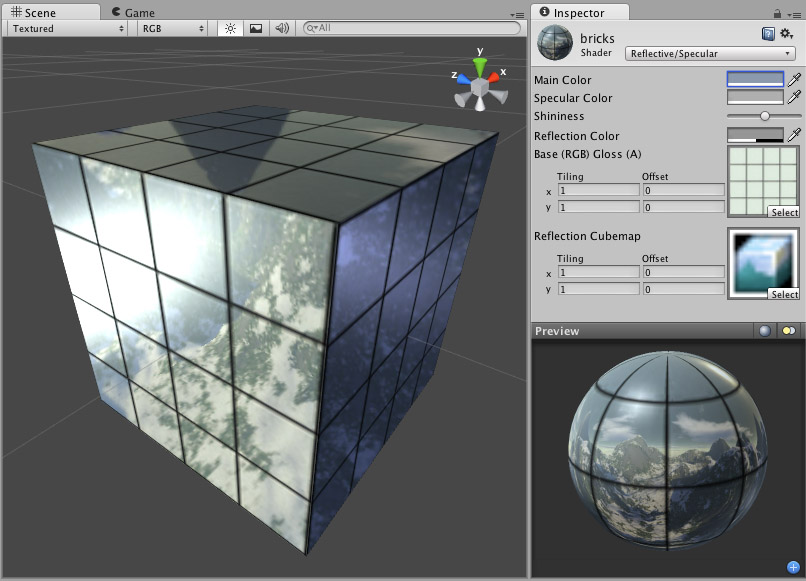Reflective Specular
Note. Unity 5 introduced the Standard ShaderA built-in shader for rendering real-world objects such as stone, wood, glass, plastic and metal. Supports a wide range of shader types and combinations. More info
See in Glossary which replaces this shaderA small script that contains the mathematical calculations and algorithms for calculating the Color of each pixel rendered, based on the lighting input and the Material configuration. More info
See in Glossary.

One consideration for this shader is that the Base texture’s alpha channel will double as both the Reflection Map and the Specular Map.
Reflective Properties
Note. Unity 5 introduced the Standard Shader which replaces this shader.
This shader will simulate reflective surfaces such as cars, metal objects etc. It requires an environment CubemapA collection of six square textures that can represent the reflections in an environment or the skybox drawn behind your geometry. The six squares form the faces of an imaginary cube that surrounds an object; each face represents the view along the directions of the world axes (up, down, left, right, forward and back). More info
See in Glossary which will define what exactly is reflected. The main texture’s alpha channel defines the strength of reflection on the object’s surface. Any sceneA Scene contains the environments and menus of your game. Think of each unique Scene file as a unique level. In each Scene, you place your environments, obstacles, and decorations, essentially designing and building your game in pieces. More info
See in Glossary lights will add illumination on top of what is reflected.
Specular Properties
Specular computes the same simple (Lambertian) lighting as Diffuse, plus a viewer dependent specular highlight. This is called the Blinn-Phong lighting model. It has a specular highlight that is dependent on surface angle, light angle, and viewing angle. The highlight is actually just a realtime-suitable way to simulate blurred reflection of the light source. The level of blur for the highlight is controlled with the Shininess slider in the InspectorA Unity window that displays information about the currently selected GameObject, Asset or Project Settings, allowing you to inspect and edit the values. More info
See in Glossary.
Additionally, the alpha channel of the main texture acts as a Specular Map (sometimes called “gloss map”), defining which areas of the object are more reflective than others. Black areas of the alpha will be zero specular reflection, while white areas will be full specular reflection. This is very useful when you want different areas of your object to reflect different levels of specularity. For example, something like rusty metal would use low specularity, while polished metal would use high specularity. Lipstick has higher specularity than skin, and skin has higher specularity than cotton clothes. A well-made Specular Map can make a huge difference in impressing the player.
Performance
Generally, this shader is moderately expensive to render. For more details, please view the Shader Peformance page.